War scars: How the West can help Ukraine clear Russian landmines
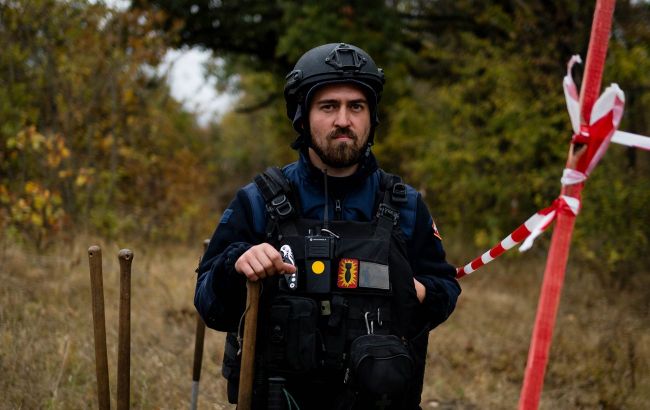 A deminer in the de-occupied territories of Ukraine (Photo: Getty Images)
A deminer in the de-occupied territories of Ukraine (Photo: Getty Images)
Ukraine is the most heavily mined country in the world. According to the latest data, about a quarter of the country's territory is dangerous due to the large number of explosive devices. Nevertheless, Ukraine, together with its allies, is working to clear de-occupied cities and villages as quickly as possible. How Switzerland is assisting in this effort is detailed in a report by RBC-Ukraine from Lausanne, Switzerland.
Today, over 20% of Ukraine's territory is mined. Agriculture, a key sector of the economy, is particularly affected. In addition, these mined areas pose a danger to civilians. Mines, grenades, and the infamous "petals" (PFM-1) are scattered across towns and villages.
Since mines from World War II are still being discovered underground, some predict that it will take Ukraine nearly a century to complete demining. However, those involved in humanitarian demining today urge people not to rely on such grim forecasts. With financial and political support from allies and a constantly developing domestic demining industry, Ukraine could get rid of a large part of these explosive hazards relatively quickly.
Switzerland is one of the countries that has committed to helping Ukraine with humanitarian demining. For over 30 years, Bern has been helping war-torn countries clear their lands of mines. As former Swiss President Ignazio Cassis said, given that Ukraine now tops the unfortunate ranking of the most mined countries globally, urgent assistance is needed. One forum where this was discussed was the demining conference held on October 17-18 in Lausanne.
Platform for dialogue
"The Russians are very insidious and creative. Their approaches vary. For example, we know that an asphalt road is safe; we avoid dirt roads, stay off the shoulders, and move along the asphalt. But there have been cases where the Russians cut out the asphalt, placed a mine underneath — usually an anti-vehicle mine — and deminers were blown up," said Tymur Pistriuha, head of the Ukrainian Deminers Association.
Pistriuha views the conference in Lausanne as a venue for establishing contacts with those who can help. The event is held in a massive building at the Hotel Management School, stretched out along a large green hill where cows graze. This classic Swiss scene is completed by the jagged line of the Alps on the horizon.
In the morning, both Swiss and Ukrainian representatives gather at the School — current Swiss President Viola Amherd, Prime Minister of Ukraine Denys Shmyhal, Ukrainian Economy Minister Yulia Svyrydenko, 2022 Swiss President Ignazio Cassis, along with dozens of journalists, press secretaries, and officials.
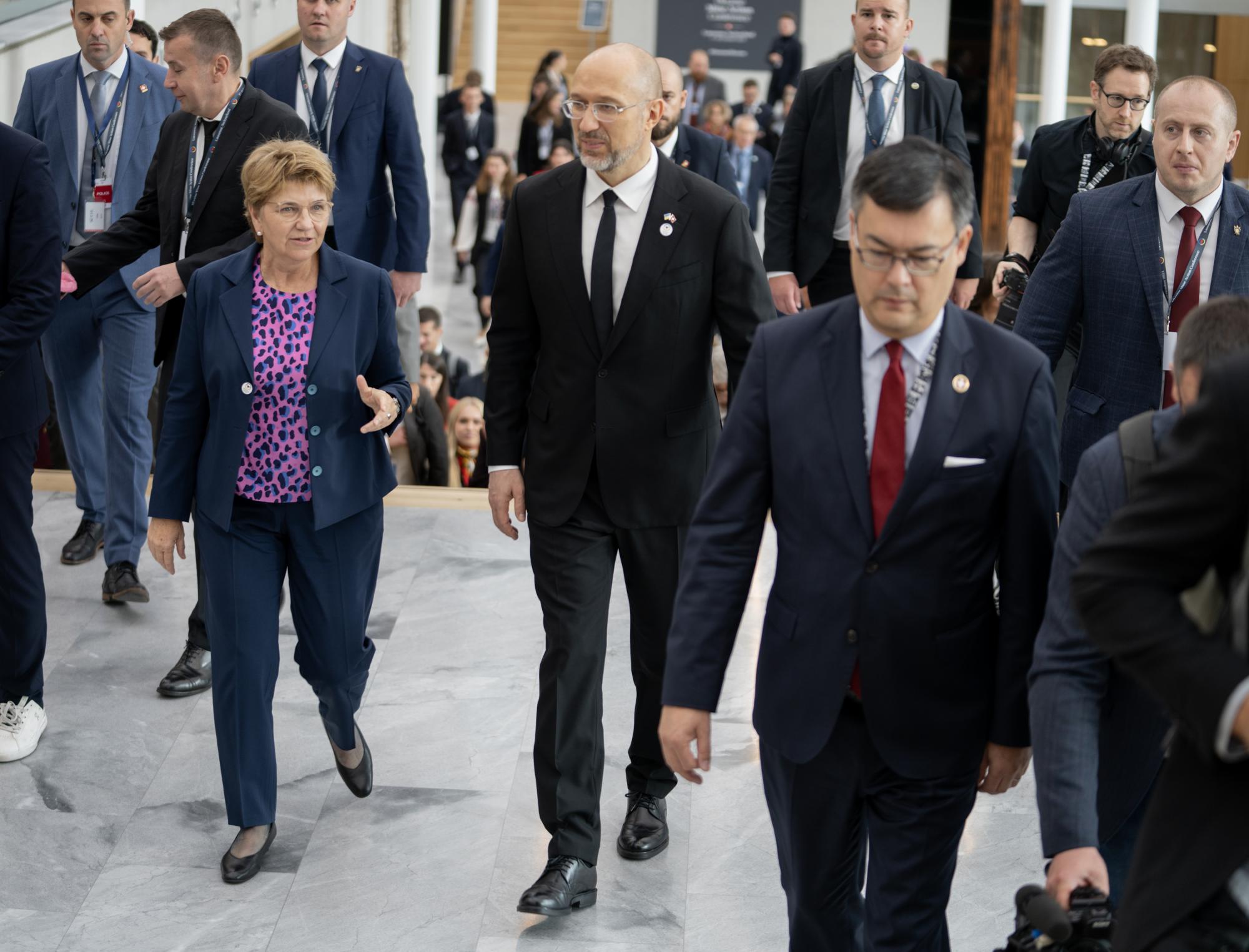 Denys Shmyhal with Viola Amherd (Photo: Swiss MFA press service)
Denys Shmyhal with Viola Amherd (Photo: Swiss MFA press service)
For visual impact, an installation is set up in the center of the lobby: a large square of floor is covered with soil, on which a trench-like structure is built, with children’s toys placed nearby. To the right of the trench, trees and bushes are “planted,” and several signs labeled "mines" and "danger" are stuck into the ground. From time to time, girls in protective masks and with metal detectors enter the square, showing the Swiss and other conference guests what a quarter of Ukraine’s territory looks like today. However, judging by the mood of the attendees, they do not seem to view this performance too seriously.
The conference opens with welcoming remarks from Viola Amherd. She appears in the lobby with Denys Shmyhal, quickly takes a photo, and then enters the main hall.
"Today, humanitarian mine action is faced with major challenges. The Ottawa Convention bans anti-personnel mines because they kill and maim indiscriminately. While the initial success of the Convention inspired optimism, in recent years this has given way to a certain disillusionment. Since 2014, the number of victims has started to rise again. Ongoing armed conflicts, such as Russia’s military aggression in Ukraine, bring new contamination from mines and other weapons," Amherd says from the stage.
Last year, Switzerland decided to provide substantial aid to Ukraine — allocating 100 million francs for humanitarian demining. Although initially, this topic might seem secondary amid the active phase of the war, the reality is that the number of mines in Ukraine today is catastrophic. Many allied countries don’t fully understand the urgency of this situation. Amherd didn’t directly address this, but she emphasized that Switzerland wants to raise awareness about humanitarian demining among other countries.
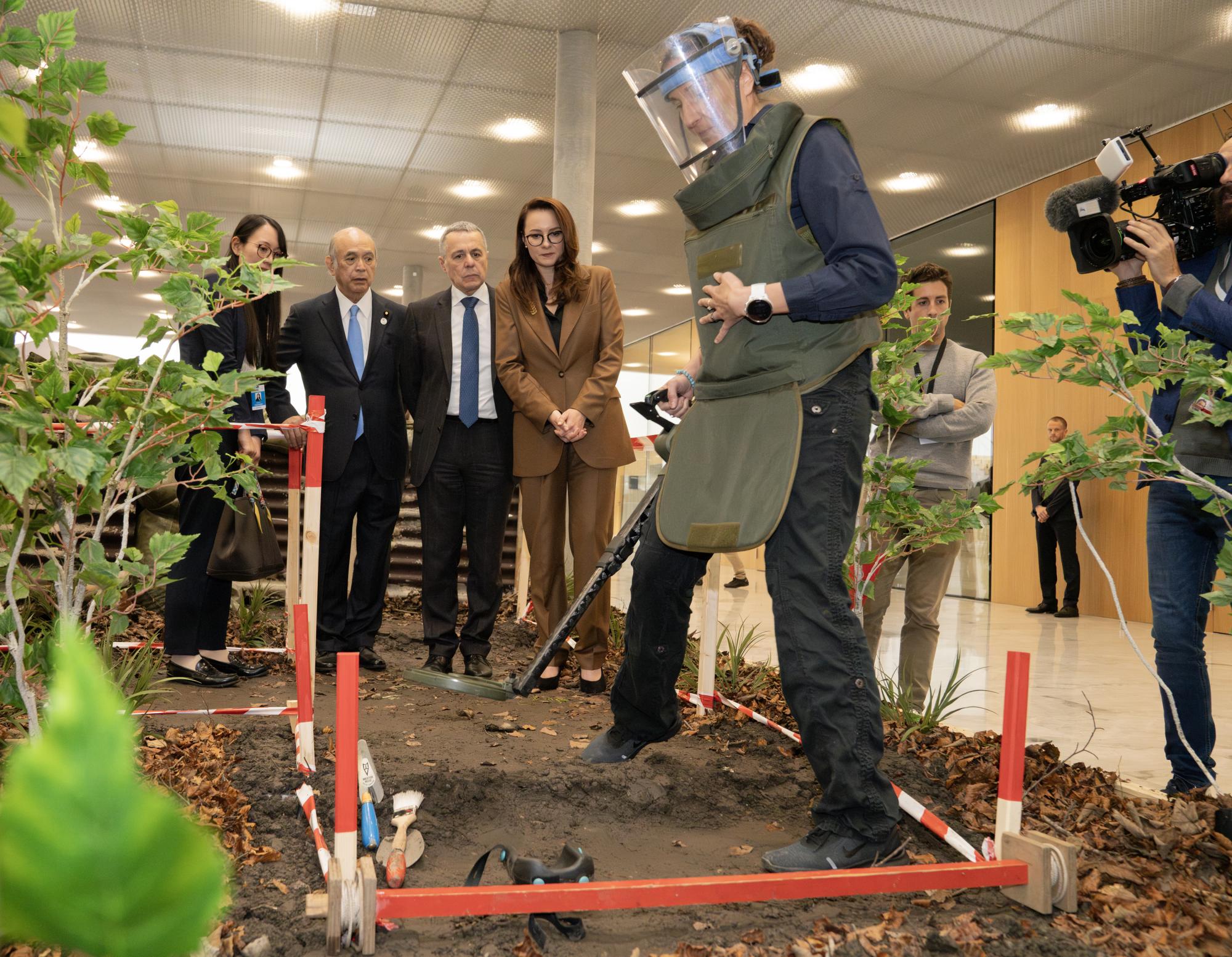 Minefield installation (Photo: Swiss MFA press service)
Minefield installation (Photo: Swiss MFA press service)
Ukrainian Prime Minister Denys Shmyhal began with thanks to the allies and specifically to Switzerland — for providing a platform for discussion and aid.
"Today, Ukraine is the most mined country in the world. Russia has mined a quarter of the territory with mines and explosive devices. This area covers 144,000 square kilometers — three times the size of Switzerland. Behind these figures are the lives of hundreds of thousands of Ukrainians. Will farmers be able to return to their fields? Will children be able to play safely? Will people be able to leave their homes without fear?" Shmyhal asked.
In his speech, the Ukrainian Prime Minister mentioned the National Mine Action Strategy. According to this document, the primary demining processes in Ukraine should be completed by 2033, but this is contingent on allied countries not leaving Kyiv alone in this situation.
"We need to create a competitive mine action system, expand production, and increase awareness. We have made significant progress in these areas and we are developing a market for humanitarian demining," Shmyhal added.
After the Prime Minister’s speech, American photographer and writer Giles Duley addressed the audience. He didn’t take the stage but sat on the steps in front of the first row. Duley is missing both legs below the knee and his left arm — he lost them in Afghanistan in 2011, when he stepped on an improvised explosive device while with a limited contingent of American troops. Duley underwent numerous surgeries and lengthy rehabilitation, then returned to Afghanistan and made a documentary about locals affected by mines.
"I’m here to remind us all of our purpose of being here. I also want to make a statement about my shorts. I never wear shorts. I don’t like the attention I get around my prosthetic legs. But I had two messages come to me this week from people who have been injured in conflict. One of them was telling me that he and his friends were asked to leave a swimming pool because people were upset at seeing their amputations. Another person told me they had been asked to leave a café because seeing the prosthetics had upset some mothers in that room. So, last night I cut my trousers turning them into shorts. Because I wanted to sit here in solidarity with everybody who walks with an injury, who has visible scars, who has prosthetics," said Duley.
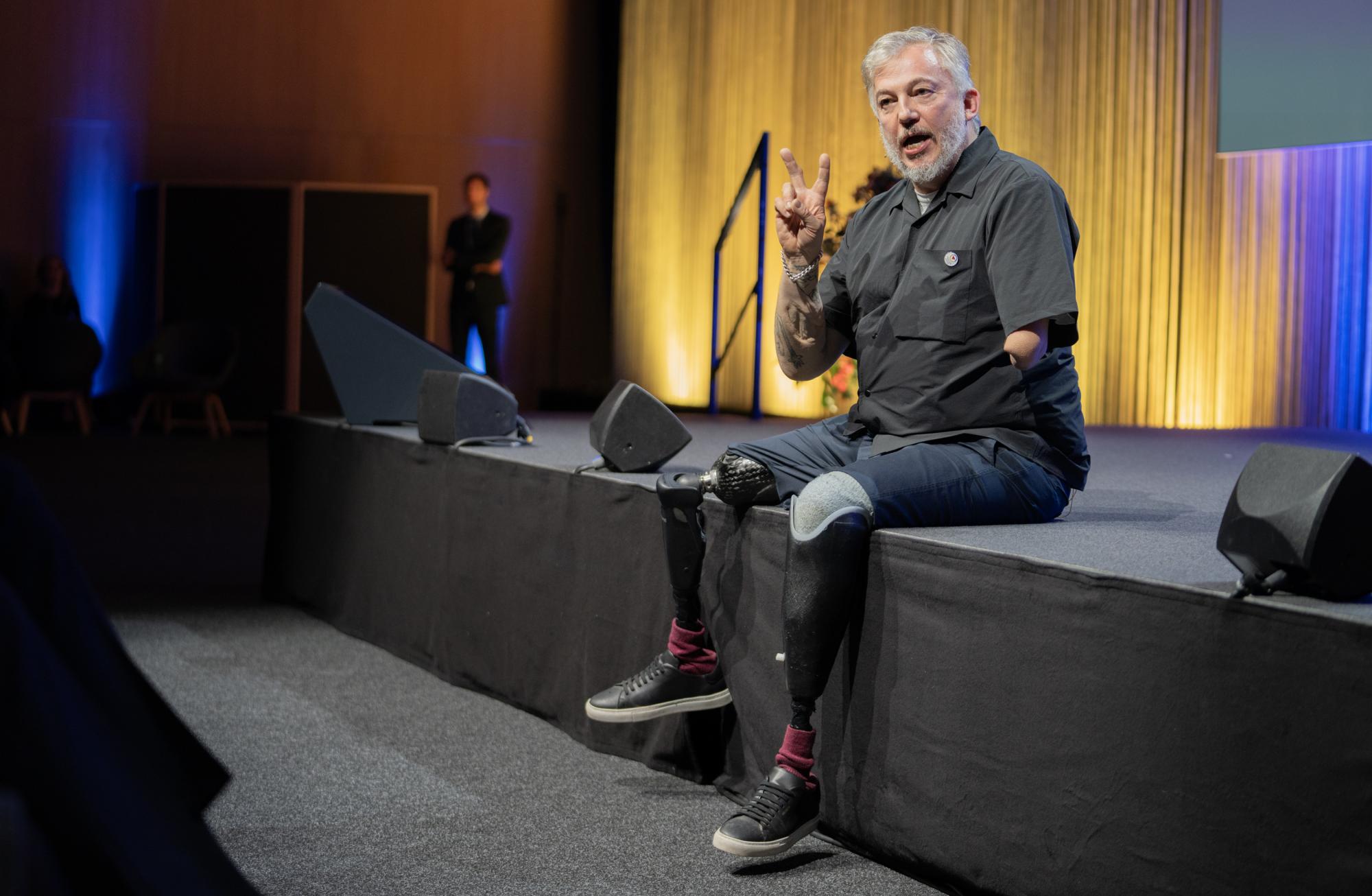
Giles Duley spoke before the conference attendees (Photo: Swiss MFA press service)
His speech, strikingly different from the reserved and polished words of other speakers, silenced the room. Duley spoke slowly, carefully observing the audience. Mines are terrifying, losing limbs is unbearable, and the world must stop turning away from this issue and the people who have lost their limbs.
Later, in the hallways, we waited for all the captivated politicians to finish speaking with Duley so we could ask for his comment.
"I have never seen contamination on the scale that we've seen there. But I'm also aware from the other countries that I work in, that if we don't clear it now, there will be children not yet born who will suffer the consequences of this war. You know, there will be a child not yet born who will lose their legs, will be killed, will be maimed. So what I think the important message is now, is that we can't wait. We have to start now," Duley said.
Yulia Svyrydenko, scheduled to speak on several panels, including closed-door sessions, lingered in the lobby. At the conference, she emphasized the financial losses Ukraine faces due to extensive land mining. The biggest losses are in agricultural lands that can’t currently be cultivated. But farmers aren’t the only ones affected by mines. This concerns public safety first and foremost.
"We, together with Palantir, launched a pilot project in Kharkiv to see how mine contamination affects local communities. What did we find? For instance, this tool showed that over 7,000 students and 765 teachers are in a risk zone in Kharkiv, as potentially mined areas are located within about 15 km of their schools," Svyrydenko shared with RBC-Ukraine.
Half of Ukraine’s schools operate online, partly due to the large number of explosive objects in frontline towns and villages. The same "petals," which may attract children, are scattered across fields and yards.
After informal conversations outside the panels, everyone gathered in the press conference room. The President of Switzerland in 2022, Ignazio Cassis, spoke before journalists. As Switzerland is a multilingual country, each speaker chose their preferred language. For Cassis, it was French. Addressing the press, he, like his colleague Viola Amherd, emphasized that the problem in Ukraine is much more extensive than it may seem.
"Ukraine is not as far from Switzerland as it may seem – just 2,300 km away. Today, it holds the sad record as the most mined country in the world. Humanitarian demining is the most critical response – the starting phase of Ukraine’s recovery. Without humanitarian demining, there will be no agricultural production, you won’t be able to feed people, and you won’t be able to let children play."
In Switzerland, people sometimes use the phrase "general engagement," which means attempting to involve everyone who can help in the demining process. In Western Europe, some countries have been helping warring countries to clear their lands of mines and unexploded ordnance for years.
European operators have become de facto monopolists in this field over decades, and Swiss officials, particularly the Ukrainian delegation, are drawing attention to this. It’s great that German and British operators are entering Ukraine, but for the Ukrainian economy, it would be more beneficial to develop this sector and gain revenue from it. This way, Ukraine could start its recovery faster after the war, using its resources.
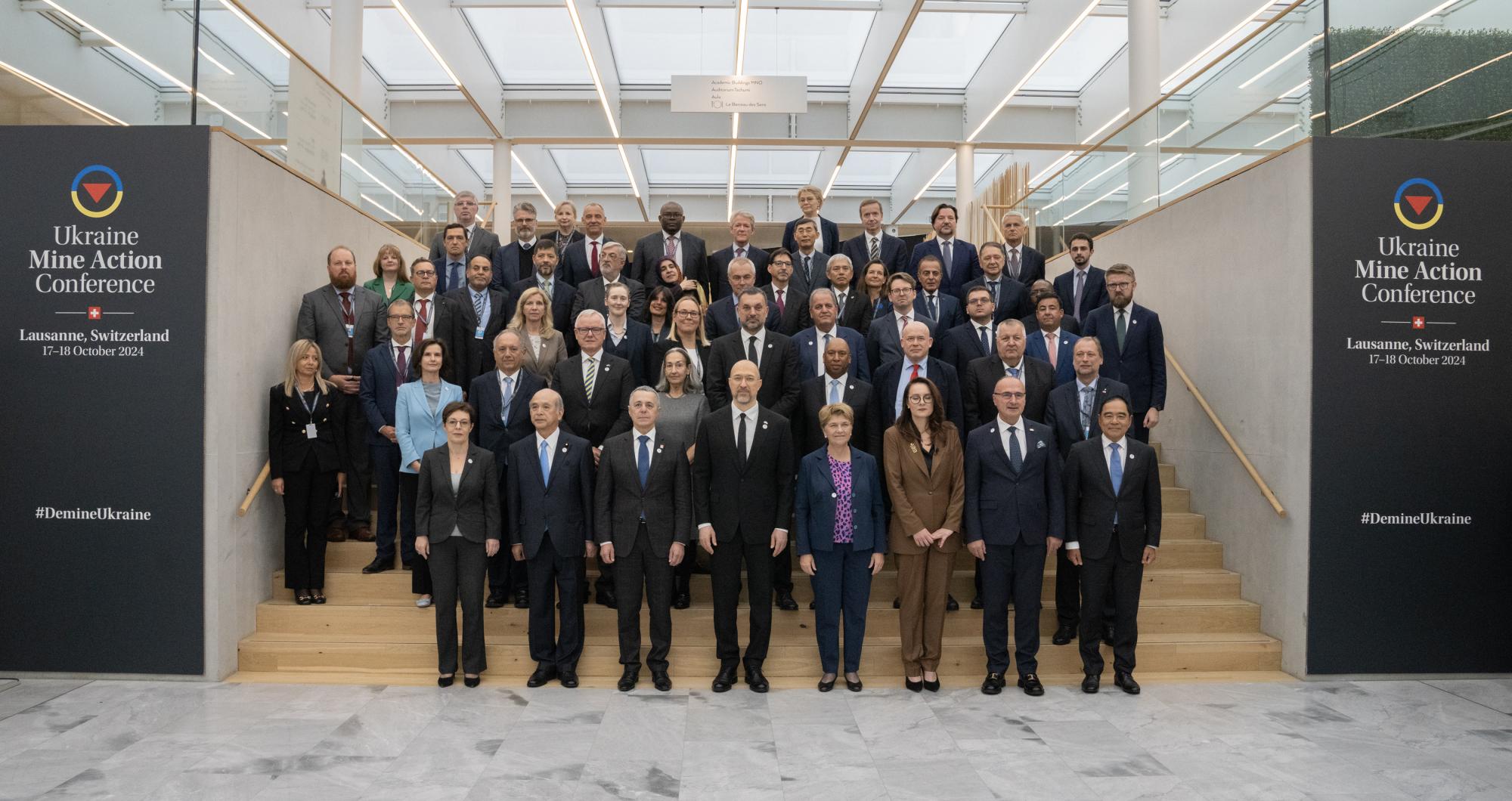 Conference participants in Lausanne (Photo: Swiss MFA press service)
Conference participants in Lausanne (Photo: Swiss MFA press service)
Behind the scenes in Lausanne
Those who frequently attend various events know that the most interesting things happen outside official speeches. The Swiss conference primarily provided the Ukrainian side with opportunities to form valuable contacts. One of those who came to present his idea and its implementation was Borys Drozhak.
"The company is called Rovertech. You know, rovers are sent to Mars; it’s essentially a ground vehicle. So, we decided to name our company that."
Backstage, Borys is described as an adventurer and enthusiast. He’s one of those who decided to compete with seasoned Western operators with years of experience. While they consider how to approach an anti-tank mine and how heavy a vehicle must be for mine clearance, Borys and his colleagues invented a lightweight, compact rover that can survive an encounter with one of the most powerful Russian mines.
"It explodes, absorbs the impact, and continues to work. There may be damage; chains might come off, but everything is inexpensive, and the most costly repair might be 28,000 hryvnias (approx $670 - Ed.)," says Borys, showing a video where the machine flies up like plastic, falls, and continues plowing the ground.
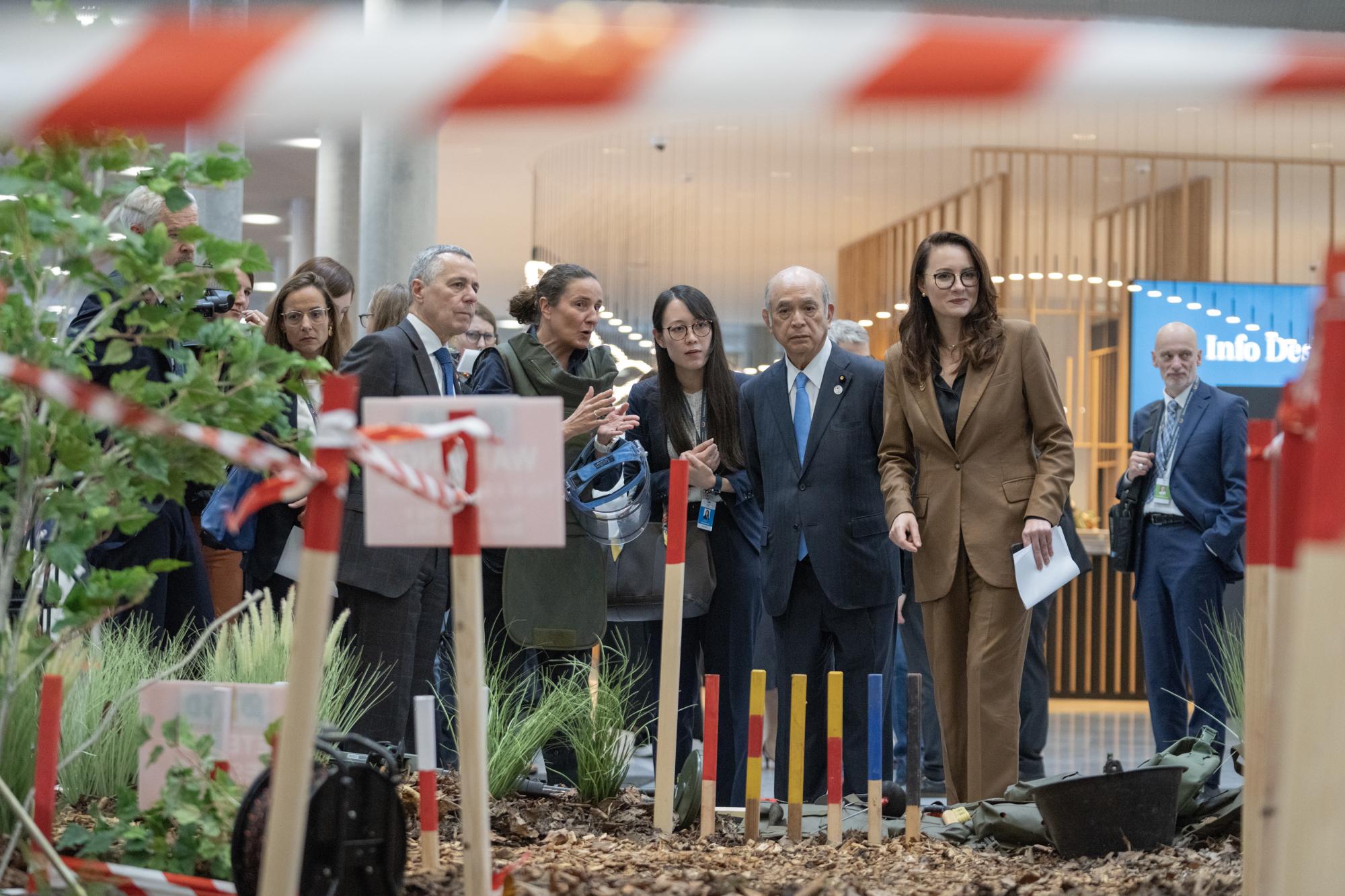
Yulia Svyrydenko (Photo: Swiss MFA press service)
The Ukrainian market liked the idea, and production of these machines began. The rover, designed in a steampunk style (by chance), turns out to be extremely mobile – its wheels are designed to navigate any terrain. With pride, Borys says that the machine from Rovertech is the only one that passed a sand test during certification, so it can work in marshy areas.
"We have two contracts with the government, not with the State Emergency Service but with the State Special Communications Service, through which other organizations purchase. There are many military units, sapper units, and private organizations. From the idea, it took a year and two months to bring to reality, with manufacturing taking about seven months. Around 20 machines in total," says Borys.
The Rovertech machine costs about $25,000, and the most expensive repair costs about 28,000 hryvnias ($670) due to the relative affordability of the parts.
"Farmers can’t wait for someone to come. Not everyone has the resources to plant other fields. They look for military deminers to check the fields around, and if there are no mines, they proceed with planting the main field. Farmers are interested in renting this machine to check for mines, so they don’t have to rely on anyone else," adds Borys.
After giving comments to journalists, Borys went on to make connections and demonstrate how his rover takes off. Tymur Pistriuha, a veteran in the demining field, shares his view. He explains why Ukraine won’t need 700 years for mine clearance.
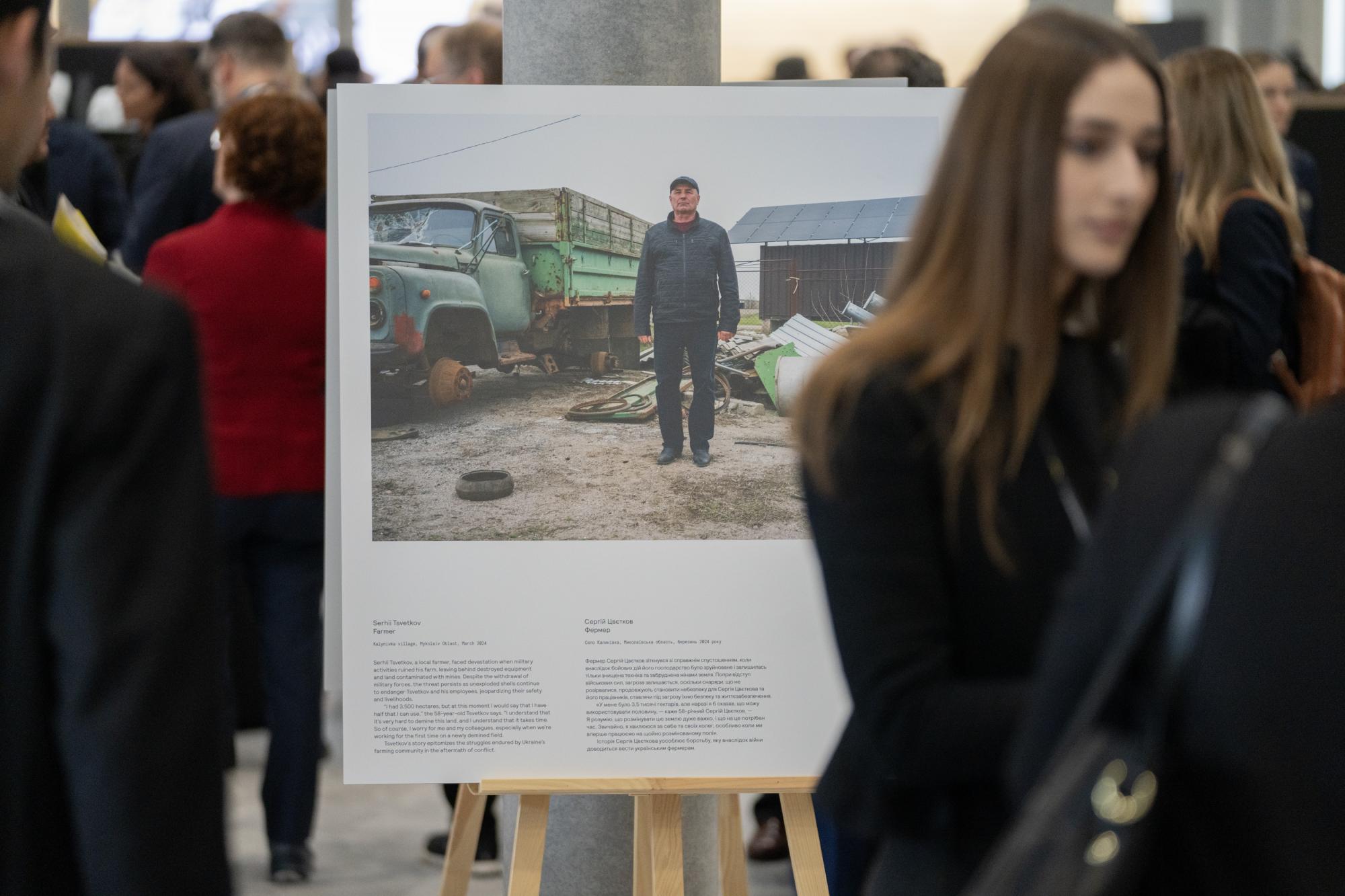 On the sidelines of the conference (Photo: Swiss FMA press service)
On the sidelines of the conference (Photo: Swiss FMA press service)
"After World War II, there was no real procedure for humanitarian demining. Certain operational tasks were being carried out around the world, but the concept of humanitarian demining emerged much later. And the reason is because humanitarian demining provides quality and safety. When we conduct humanitarian demining, the risk of something being left behind after years is minimal.
According to Pistriuha’s forecasts, based on the National Mine Action Strategy, it will take ten years to make 70% of land available for demining. The priority is critical infrastructure facilities, followed by farmland. A colossal issue is forests. They are literally filled with 'petals,' tripwires, and mines.
"We don't go into the 20-kilometer buffer zone, which lies between the front line and the borders with Russia and Belarus, extending over 20 km. However, there are many de-occupied areas, the most contaminated being Kherson, Kharkiv, and Mykolaiv regions. Incidentally, 50% of mine incidents occur in these three regions," Pistriuha added.
While we caught speakers in the corridors, a GCS-200 demining vehicle was handed over to the Ukrainian delegation outside. The massive iron machine, painted in military colors, looked somewhat out of place against the backdrop of pristine green hills and cows lazily chewing grass. Military equipment also seemed odd on Ukrainian fields — until the occupiers burned them to the ground.
Every conference has what happens after the main negotiations and important decisions. The Swiss government has decided to allocate an additional 30 million francs to Ukraine for demining, along with two more GCS-200 machines. Other allies are also helping Ukrainians clear their lands of Russian mines. One can hope that, with such support, the bleakest predictions regarding demining in the country will not come true.

